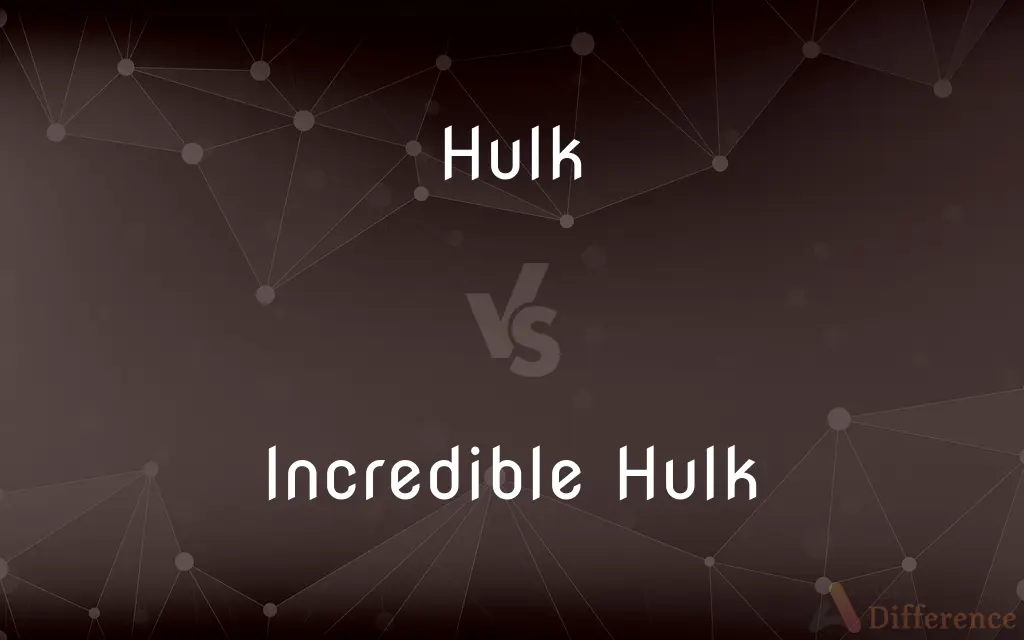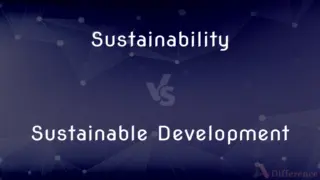Hulk vs. Incredible Hulk — What's the Difference?
Edited by Tayyaba Rehman — By Urooj Arif — Published on February 20, 2024
"Hulk" refers to the comic book character known for his green skin and immense strength. "Incredible Hulk" is often used to denote the comic series or specific adaptations emphasizing his extraordinary abilities.

Difference Between Hulk and Incredible Hulk
Table of Contents
ADVERTISEMENT
Key Differences
The term "Hulk" refers broadly to the fictional superhero character created by writer Stan Lee and artist Jack Kirby for Marvel Comics, first appearing in "The Incredible Hulk" #1 in 1962. The character, Dr. Bruce Banner, transforms into the Hulk, a large, green-skinned powerhouse of physical strength, whenever he is subjected to emotional stress or anger. This transformation is triggered by gamma radiation exposure, which Banner experienced during a bomb test.
"Incredible Hulk," on the other hand, often specifically denotes the comic book titles, television series, and movies centered on this character. The adjective "incredible" underscores the extraordinary and unparalleled nature of the Hulk's strength and capabilities, distinguishing the stories and adaptations that focus particularly on his superhuman feats and adventures. The "Incredible Hulk" title has been used for various media, including a notable television series that aired from 1978 to 1982 and several feature films.
While "Hulk" can refer to the character in any context or media adaptation, "Incredible Hulk" is used more specifically to highlight the remarkable aspects of the character's storylines or to distinguish between different series and adaptations. For example, a comic book reader might refer to "Hulk" when talking about the character in general but use "Incredible Hulk" when referring to a specific comic series or adaptation that focuses heavily on the character's extraordinary adventures and battles.
The distinction between the two terms is more about emphasis and context rather than indicating any difference in the character itself. Both "Hulk" and "Incredible Hulk" refer to the same iconic Marvel superhero known for his unmatched strength and the emotional and physical struggles of his alter ego, Dr. Bruce Banner. The use of "Incredible" serves to emphasize the exceptional and awe-inspiring nature of the Hulk's persona and stories.
In essence, the Hulk is a character that embodies the conflict between man's intellectual and primal sides, with "Incredible Hulk" highlighting the extraordinary and fantastic elements of his narrative within the Marvel Universe. Whether referred to simply as "Hulk" or more formally as "Incredible Hulk," the character remains one of the most enduring and beloved figures in comic book history.
ADVERTISEMENT
Comparison Chart
Reference
General character name
Specific comic series or adaptations
Emphasis
Character's identity and concept
Exceptional nature of the character's abilities
Usage
Broad, across all media and discussions
Specific to titles emphasizing extraordinary feats
Context
Any appearance or mention of the character
Adaptations and series titled "Incredible Hulk"
Implication
The character in any situation
Stories focusing on the character's superhuman aspects
Compare with Definitions
Hulk
Featured in comics, movies, and television series.
The Hulk has been a central figure in Marvel's cinematic universe.
Incredible Hulk
Emphasizes the extraordinary aspects of Hulk's character.
The Incredible Hulk showcases the limitless strength and endurance of the character.
Hulk
Symbolizes the battle between rage and intelligence.
The Hulk represents the internal struggle between man's anger and reason.
Incredible Hulk
Represents the awe-inspiring nature of Hulk's abilities.
Only the Incredible Hulk could stop the rampaging monster.
Hulk
Known for the catchphrase Hulk smash!
In battle, the Hulk often resorts to his simple but effective strategy: 'Hulk smash!'
Incredible Hulk
Title of the comic series featuring the superhero Hulk.
The Incredible Hulk comic series explores the complexities of Bruce Banner's life.
Hulk
A superhero character known for his green skin and immense strength.
When angered, Bruce Banner transforms into the Hulk.
Incredible Hulk
Differentiates between various media representations.
The Incredible Hulk film in 2008 rebooted the character's cinematic journey.
Hulk
A character with a dual identity as Dr. Bruce Banner.
The Hulk and Bruce Banner share a body but have vastly different personalities.
Incredible Hulk
Used to denote specific adaptations and storylines.
The Incredible Hulk television series brought the character to a wide audience in the 1970s.
Hulk
A heavy, unwieldy ship.
Hulk
The hull of an old, unseaworthy, or wrecked ship.
Hulk
Often hulks An old or unseaworthy ship used as a prison or warehouse.
Hulk
One, such as a person or object, that is bulky, clumsy, or unwieldy.
Hulk
A wrecked or abandoned shell of a usually large object, such as a building or vehicle.
Hulk
To appear as a massive or towering form; loom
The big truck hulked out of the fog.
Hulk
To move clumsily.
Hulk
(nautical)
Hulk
(archaic) A large ship used for transportation; (more generally) a large ship that is difficult to manoeuvre.
Hulk
(by extension) A non-functional but floating ship, usually stripped of equipment and rigging, and often put to other uses such as accommodation or storage.
Hulk
(figuratively) A large structure with a dominating presence.
Hulk
(figuratively) A big (and possibly clumsy) person.
Hulk
(bodybuilding) An excessively muscled person.
Hulk
To reduce (a ship) to a non-functional hulk.
Hulk
To temporarily house (goods, people, etc.) in such a hulk.
Hulk
(transitive) To move (a large, hulking body).
Hulk
(intransitive) To be a hulk, that is, a large, hulking, and often imposing presence.
Hulk
(intransitive) Of a (large) person: to act or move slowly and clumsily.
Hulk
To remove the entrails of; to disembowel.
Hulk
The body of a ship or decked vessel of any kind; esp., the body of an old vessel laid by as unfit for service.
Hulk
A heavy ship of clumsy build.
Hulk
Anything bulky or unwieldly.
Hulk
To take out the entrails of; to disembowel; as, to hulk a hare.
Hulk
A very large person; impressive in size or qualities
Hulk
A ship that has been wrecked and abandoned
Hulk
Appear very large or occupy a commanding position;
The huge sculpture predominates over the fountain
Large shadows loomed on the canyon wall
Common Curiosities
Why does Bruce Banner transform into the Hulk?
Due to exposure to gamma radiation and emotional stress.
Has the Hulk always been green?
He was originally gray but became green to resolve printing issues.
Who created the Hulk?
Stan Lee and Jack Kirby.
What distinguishes Hulk from Incredible Hulk?
"Incredible Hulk" specifically refers to titles highlighting his extraordinary abilities.
What is the main theme of the Hulk stories?
The conflict between man's primal rage and intellect.
Are there different versions of the Hulk in comics?
Yes, including Grey Hulk, Red Hulk, and others.
How does the Hulk communicate?
Often with limited vocabulary, emphasizing his primal nature.
How do the powers of Hulk and Incredible Hulk compare?
They are the same; "Incredible" highlights his awe-inspiring abilities.
What's the significance of the title "Incredible Hulk"?
It underscores the exceptional and awe-inspiring nature of the character's stories.
Who are some of the Hulk's main adversaries?
The Abomination, Leader, and General Thunderbolt Ross.
Can the Hulk be injured?
He is incredibly resistant to injury but not invincible.
Does the Hulk have allies?
Yes, including the Avengers and sometimes Wolverine.
What role does anger play in Hulk's powers?
His strength increases with his anger.
Has the Hulk ever been a villain?
He's often portrayed as a misunderstood hero, but his actions can sometimes make him an antagonist.
How do Bruce Banner and the Hulk coexist?
They share the same body but represent different aspects of the same person, often struggling for control.
Share Your Discovery

Previous Comparison
Corona vs. Modelo
Next Comparison
Sustainability vs. Sustainable DevelopmentAuthor Spotlight
Written by
Urooj ArifUrooj is a skilled content writer at Ask Difference, known for her exceptional ability to simplify complex topics into engaging and informative content. With a passion for research and a flair for clear, concise writing, she consistently delivers articles that resonate with our diverse audience.
Edited by
Tayyaba RehmanTayyaba Rehman is a distinguished writer, currently serving as a primary contributor to askdifference.com. As a researcher in semantics and etymology, Tayyaba's passion for the complexity of languages and their distinctions has found a perfect home on the platform. Tayyaba delves into the intricacies of language, distinguishing between commonly confused words and phrases, thereby providing clarity for readers worldwide.














































